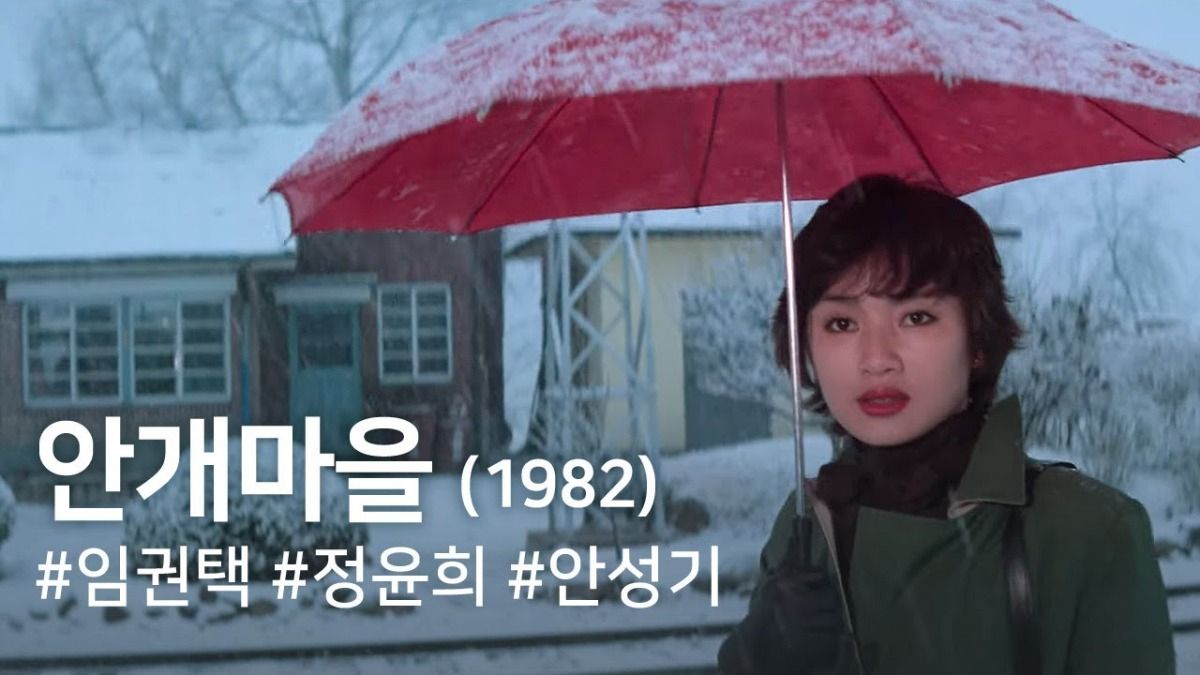“With no moralising aim or conclusion, all of Im Kwon-taek’s films in turn propose an examination of the national conscience, a series of changing viewpoints that question the country whose story he tells.”
Jérôme BaronThe Village of Mist (안개마을) 1983
Directed by the acclaimed filmmaker Im Kwon-taek, “Village of Mist” represents another evolution in his extensive cinematic journey. Adapted from Lee Mun-yeol’s short story “The Island of Anonymity,” the film continues Im’s clear departure from his earlier works, which often revolved around traditional narrative structures and were genre films. Instead, “Village of Mist” delves into deeper philosophical themes and rich character studies, inviting viewers to ponder the complexities of ethical dilemmas in contemporary and historical Korean society. The film garnered the prestigious Baeksang Art Award Grand Prize for Best Film, highlighting its artistic merit.
The narrative centres around Han Su-ok, portrayed with sensitivity by Jeong Yun-hui, a fresh-faced teacher who takes a job in a secluded mountain village while her fiancé fulfils his military obligations. As she steps into this remote landscape, the first figure she encounters is Kkae-cheol, played by the venerable Ahn Sung-ki. Kkae-cheol is portrayed as a complex drifter bearing the weight of disability, his dishevelled appearance contrasting sharply with the Su-ok’s clean city fashion. His penetrating gaze unnerves Su-ok, foreshadowing the emotional and ethical intricacies that lie ahead as the story unfolds. Su-ok’s intrigue deepens as she witnesses the villagers’ dual nature towards Kkae-cheol—while they offer him food and shelter, they simultaneously demean him, labelling him a eunuch. This paradox fuels her desire to uncover the underlying truths of village life. Why do the villagers put up with Kkae-cheol, an outsider to this clan?
Im Kwon-taek skillfully creates an atmosphere of unease through the occasional use of a shaky handheld camera, contrasting with the predominantly static mid-shots that lend the film a contemplative quality. The soundtrack plays a crucial role, as Im opts for the unconventional choice of Western tunes, specifically two tracks by Yazoo, a British synth-pop band of the 1980s,: ‘Don’t Go’ and ‘Only You.’ This choice amplifies the difference between Su-ok and the villagers, playing during moments when Su-ok finds herself alone—writing a letter to her distant fiancé and awaiting his arrival at a train station.
Throughout “Village of Mist,” Im engages in a profound examination of the contradictions inherent in the depiction of a traditional Korean village. He challenges prevailing notions that modern Korea is devoid of moral integrity, suggesting instead that much of humanity’s ethical lapses stem from a collective reluctance to confront uncomfortable truths. As Su-ok teaches her students a fundamental tenet of Confucianism—that actions hold more significance than mere words—the narrative subtly questions the righteousness of societal norms without overt judgment, simply illuminating the complexities that lie beneath the surface. While the film maintains a compelling intrigue and the cast expertly transcends typical stereotypes in their character portrayals. However, my main criticism focuses on one challenging scene. Although the scene was executed beautifully on film, the emotional impact of its aftermath was surprisingly muted, leaving a sense of unfulfilled resonance. Rather than being treated with the gravity it deserved, this moment was merely resolved as a means to close the mystery.
I have provided the full movie below, sourced from the Korean Classic Film channel on YouTube, so you can easily access it.
Have you ever had the chance to watch Village of Mist? I’d love to hear your thoughts on it! Additionally, I’m eager to know which film you’d like me to review next. Please share your recommendations in the comments—I’m looking forward to exploring your suggestions!
